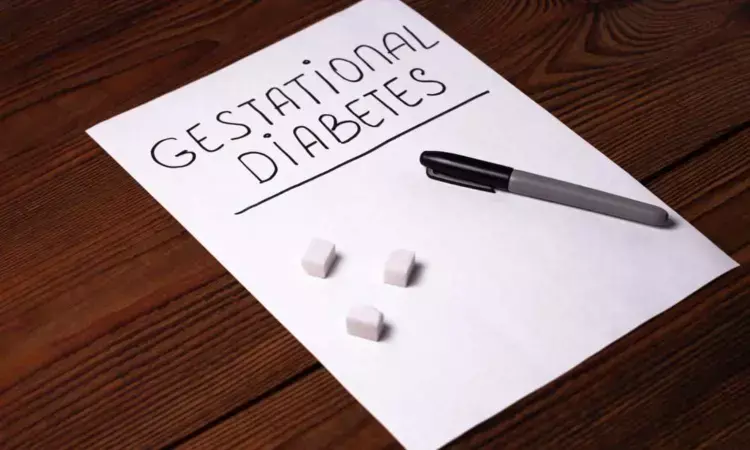- Home
- Medical news & Guidelines
- Anesthesiology
- Cardiology and CTVS
- Critical Care
- Dentistry
- Dermatology
- Diabetes and Endocrinology
- ENT
- Gastroenterology
- Medicine
- Nephrology
- Neurology
- Obstretics-Gynaecology
- Oncology
- Ophthalmology
- Orthopaedics
- Pediatrics-Neonatology
- Psychiatry
- Pulmonology
- Radiology
- Surgery
- Urology
- Laboratory Medicine
- Diet
- Nursing
- Paramedical
- Physiotherapy
- Health news
- Fact Check
- Bone Health Fact Check
- Brain Health Fact Check
- Cancer Related Fact Check
- Child Care Fact Check
- Dental and oral health fact check
- Diabetes and metabolic health fact check
- Diet and Nutrition Fact Check
- Eye and ENT Care Fact Check
- Fitness fact check
- Gut health fact check
- Heart health fact check
- Kidney health fact check
- Medical education fact check
- Men's health fact check
- Respiratory fact check
- Skin and hair care fact check
- Vaccine and Immunization fact check
- Women's health fact check
- AYUSH
- State News
- Andaman and Nicobar Islands
- Andhra Pradesh
- Arunachal Pradesh
- Assam
- Bihar
- Chandigarh
- Chattisgarh
- Dadra and Nagar Haveli
- Daman and Diu
- Delhi
- Goa
- Gujarat
- Haryana
- Himachal Pradesh
- Jammu & Kashmir
- Jharkhand
- Karnataka
- Kerala
- Ladakh
- Lakshadweep
- Madhya Pradesh
- Maharashtra
- Manipur
- Meghalaya
- Mizoram
- Nagaland
- Odisha
- Puducherry
- Punjab
- Rajasthan
- Sikkim
- Tamil Nadu
- Telangana
- Tripura
- Uttar Pradesh
- Uttrakhand
- West Bengal
- Medical Education
- Industry
Increased GDM risk observed in pregnant women with isolated maternal hypothyroxinemia: Study

A new study published in the European Journal of Obstetrics & Gynecology and Reproductive Biology showed that gestational diabetes mellitus (GDM) was much more likely to occur in pregnant women with isolated maternal hypothyroxinemia (IMH), particularly if IMH continued throughout both trimesters.
In contrast to overt hypothyroidism, isolated maternal hypothyroxinemia (IMH) is a pregnancy disease characterized by low free thyroxine (fT4) levels with normal thyroid-stimulating hormone (TSH). Although IMH frequently shows no symptoms, it can affect the development of the embryonic brain, particularly during the first trimester. A frequent pregnancy condition, gestational diabetes mellitus (GDM) involves glucose intolerance and raises the risk of complications such as preterm delivery, macrosomia, preeclampsia, and neonatal problems. This study was carried out by Hao-Yi Jia and associates to investigate the relationship between early pregnancy IMH and the risk of GDM as well as its correlation with unfavorable perinatal outcomes.
Between January 2020 and June 2021, 2,741 pregnant women who visited Shanghai General Hospital's obstetric outpatient clinic and had standard obstetric exams were included in the research. Individuals who had a IMH diagnosis during the first trimester were classified as H1(+), while those who did not were classified as H1(−).
In a similar vein, those with a IMH diagnosis during the second trimester were classified as H2(+), whereas those without were classified as H2(−). Group A H1(−) H2(−), (n = 1,886); group B H1(+) H2(−), (n = 99); group C H1(−) H2(+), (n = 613); and group D H1(+) H2(+), (n = 143) were created based on these classifications. All four groups' clinical data, including pregnancy problems, were examined using retrospective analysis.
With the following trend: group D > group C > group B > group A, the incidence of GDM was substantially greater in groups B, C, and D than in group A. In particular, the greatest prevalence of GDM was seen in group D.
IMH in the first trimester, IMH in the second trimester, and persistent IMH in both trimesters were determined to be significant risk factors for GDM by logistic regression analysis that controlled for confounding variables. Also, the risk of GDM was 73.97 times greater than the usual risk in instances with chronic IMH.
In additionally, this study discovered a substantial correlation between unfavorable perinatal outcomes and isolated maternal hypothyroxinemia (IMH). Overall, an increased risk of GDM and insulin resistance is closely linked to IMH in the first or second trimester, and especially chronic IMH in both trimesters.
Source:
Jia, H.-Y., He, P.-Y., Lu, C., Zhou, M.-J., Zhan, S.-T., Zhong, H.-Q., & Xu, X.-M. (2025). Association of isolated maternal hypothyroxinemia with gestational diabetes mellitus and perinatal outcomes. European Journal of Obstetrics, Gynecology, and Reproductive Biology, 114015, 114015. https://doi.org/10.1016/j.ejogrb.2025.114015
Neuroscience Masters graduate
Jacinthlyn Sylvia, a Neuroscience Master's graduate from Chennai has worked extensively in deciphering the neurobiology of cognition and motor control in aging. She also has spread-out exposure to Neurosurgery from her Bachelor’s. She is currently involved in active Neuro-Oncology research. She is an upcoming neuroscientist with a fiery passion for writing. Her news cover at Medical Dialogues feature recent discoveries and updates from the healthcare and biomedical research fields. She can be reached at editorial@medicaldialogues.in
Dr Kamal Kant Kohli-MBBS, DTCD- a chest specialist with more than 30 years of practice and a flair for writing clinical articles, Dr Kamal Kant Kohli joined Medical Dialogues as a Chief Editor of Medical News. Besides writing articles, as an editor, he proofreads and verifies all the medical content published on Medical Dialogues including those coming from journals, studies,medical conferences,guidelines etc. Email: drkohli@medicaldialogues.in. Contact no. 011-43720751


